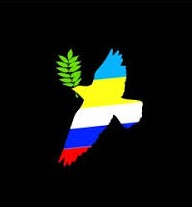
How Ukrainian refugees find safety in the EU: Dima's story
The New Humanitarian 10/06/2022
An untold number of LGBTQI+ Ukrainians – especially trans women, trans men, and non-binary people – have faced barriers trying to exit Ukraine. This is Dima's story [collected by The New Humanitarian].
In just over three months since Russia began its full-scale invasion, nearly seven million people have fled Ukraine as refugees. The vast majority are Ukrainian women and children who have been received in neighbouring countries, mainly with open arms.
However, an untold number of LGBTQI+ Ukrainians – especially trans women, trans men, and non-binary people – have faced barriers trying to exit Ukraine. Dozens have reportedly been turned back at official Ukrainian border crossings and have experienced mistreatment by Ukrainian authorities.
Activists and advocates also worry that LGBTQI+ refugees will face discrimination in EU countries bordering Ukraine, such as Poland and Hungary, which both have dismal records when it comes to supporting and protecting LGBTQI+ rights.
LGBTQI+ people face specific vulnerabilities during conflict, including heightened risks of stigmatisation, harassment, and violence from both combatants and civilians, as well as protection gaps in refugee responses, according to the UN.
Since Russia’s invasion began, fighting has disrupted supply chains and medical services inside Ukraine, creating a shortage of necessary hormone therapy drugs for trans people, HIV medication, and other important medical treatments. At the same time, a ban prohibiting men between 18 and 60 from leaving the country, and bureaucratic barriers – such as travel documents that don’t match the gender identity of trans refugees – have made it more difficult for gender-diverse people to seek safety outside Ukraine.
Widespread anti-LGBTQI+ sentiment in Ukrainian society, fear of being discriminated against, and worries over disclosing sensitive information to officials at borders, as well as reports of people being turned away and experiencing sexual, physical, and verbal harassment from Ukrainian border guards have also deterred many LGBTQI+ people from trying to leave, according to LGBTQI+ activists The New Humanitarian spoke to.
The issue has drawn the attention of members of the European Parliament. Robert Bierdroń, a Polish MEP and chair of the European Parliament’s Committee on Women’s Rights and Gender Equality, wrote a letter to Ukrainian President Volodymyr Zelensky and the commander of the State Border Guard Service of Ukraine on 1 June – the first day of Pride Month – asking them to introduce special procedures to allow trans women to leave the country despite the gender marker in their passports.
Activists in Ukraine and across Europe have also mobilised to help gender-diverse Ukrainians seek safety and reach refugee-hosting countries where they are more likely to find support.
“What LGBT people want is help from other LGBT people,” said one LGBTQI+ activist in Poland, who asked to remain anonymous out of fear they could face criminal charges for helping refugees enter the country outside of official border crossings.
[…]
‘The water in the river was freezing’
Dima, a 27-year-old gay Ukrainian living with HIV whose last name is being withheld to protect his privacy, is one of the LGBTQI+ refugees who struggled to leave Ukraine.
As someone with HIV, Dima thought he would be exempt from the ban on men between 18 and 60 leaving the country, but was turned back from official border crossings multiple times. When the hotel where he was staying in the western Ukrainian city of Lviv had its windows blown out by a Russian missile strike, Dima decided he needed to find another way out. That is how he found himself wading into a cold river separating Ukraine from Poland in early March.
“The water in the river was freezing. I took all of my clothes off and put them in a plastic bag and tied my Doc Martens around my neck so they wouldn’t get wet because the last thing I wanted if I needed to run are wet boots,” Dima told The New Humanitarian.
The crossing did not go as planned: Alice Chuvnik, a 24-year-old trans Ukrainian living with autism who uses they/them pronouns and who suffers from chronic seizures, was crossing the river with Dima. Alice had also been turned back from official border crossings multiple times.
When Alice reached the middle of the river, they had a seizure. Their partner, Robin, a 29-year-old non-binary Dutch national who also lives with autism, was waiting on the opposite bank along with Rain Dove Dubilewski, a London-based LGBTQI+ activist who also uses they/them pronouns and has been helping evacuate marginalised groups from Ukraine. Robin and Rain Dove jumped into the river and helped Alice reach the shore.
In retrospect, the dramatic crossing seems like a blur to Dima. “I was told I got across really quickly even though the river was 60 metres wide, but all I remember is my heavy, wet boots weighing my neck down,” he said.
Dima has since made his way to Berlin after entering Poland, but while trying to leave Ukraine he missed two weeks of his HIV medication, increasing the risk of developing drug resistance and causing a great deal of stress.
[…]
Ukraine’s State Border Guard Service has said that the ban on men between the ages of 18 and 60 leaving the country, which is the reason why some LGBTQI+ people have been turned back at the border, is necessary in order to provide for Ukraine’s defence.
“Martial law is sexist. Period,” Rain Dove said. “It needs to be reshaped. It leads to black-and-white choices, with nothing in between. People should want to stay, not be forced to stay, especially when they have the documentation to leave.”
[…]


